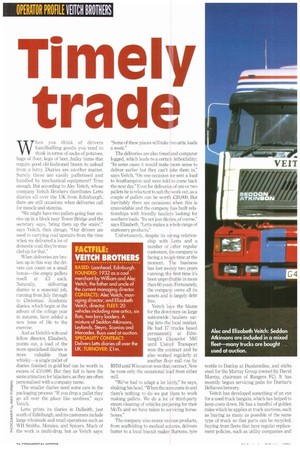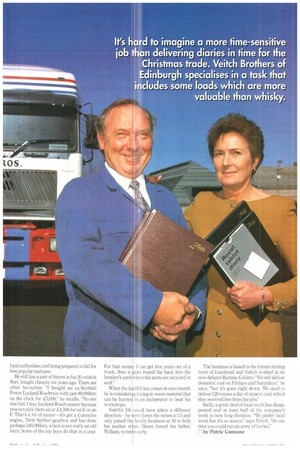OPERATOR PROFILE VEITCH BROTHERS
Page 38

Page 39

If you've noticed an error in this article please click here to report it so we can fix it.
TrneIy trade
When you think of drivers hanciballing goods you tend to think in terms of sacks of potatoes, bags of flour, kegs of beer...bulky items that require good old-fashioned brawn to unload from a lorry. Diaries are another matter. Surely these are easily palletised and handled by mechanical equipment? True enough. But according to Alec Witch, whose company Witch Brothers distributes Letts diaries all over the UK from Edinburgh, there are still occasions when deliveries call for muscle and stamina.
"We might have two pallets going four stories up in a block near Thwer Bridge and the secretary says, 'bring them up the stairs'," says Neitch, then shrugs, "Our drivers are used to carrying coal upstairs from the time when we delivered a lot of domestic coal; they're muscled up for that."
When deliveries are broken up in this way the drivers can count on a small bonus—the empty pallets resell at £3 each.
Naturally, delivering diaries is a seasonal job, running from July through to Christmas. Academic diaries, which begin at the advent of the college year in autumn, have added a new lease of life to the exercise.
And as Witch's wife and fellow director, Elizabeth, points out, a load of the more specialised diaries is more valuable than whisky a single pallet of diaries finished in gold leaf can be worth in excess of £10,000. But they fail to have the same attraction for hijackers, as they are often personalised with a company name.
2 The smaller diaries need some care in the cc 2 packaging process: "If you drop a pallet they go all over the place like sardines," says z
< Witch.
Lefts prints its diaries in Dalkeith, just
south of Edinburgh, and its customers include glarge wholesale and retail operations such as bWM Smiths, Menzies, and Spicers. Much of k the work is multi-drop, but as Witch says:
FACTFIL E:
"Some of these places will take two artic loads a week."
The deliveries are also timed and computer logged, which leads to a certain inflexibility: "In some cases it would make more sense to deliver earlier but they can't take them in," says Veitch, "On one occasion we sent a load to Southampton and were told to come back the next day." Even for deliveries of one or two pallets he is reluctant to sub the work out, as a couple of pallets can be worth .£20,000. But inevitably there are occasions when this is unavoidable and the company has built relationships with friendly hauliers looking for southern loads. "Its not just diaries, of course," says Elizabeth, "Letts makes a whole range of stationery products," Unfortunately, despite its strong relationship with Letts and a number of other regular customers, the company is facing a tough time at the moment. The business has lost money two years running; the first time it's been unprofitable in more than 60 years. Fortunately, the company owns all its assets and is largely debt free.
Veitch lays the blame for the downturn on large nationwide hauliers eating into the local market. He had 17 trucks based permanently at Edinburgh's Chancelot Mill until United Transport won the contract and he also worked regularly at another flour mill run by RI-EVI until Wincanton won that contract. Now he runs only the occasional load from either mill.
"We've had to adapt a lot lately," he says, shaking his head. "When the men come in and there's nothing to do we put them to work making pallets. We do a lot of third-party steam cleaning of vehicles preparing for their MoTs and we have taken to servicing horseboxes."
The company also stores various products, from scaffolding to medical sutures, delivers butter to a local biscuit maker Burtons, tyre textile to Dunlop at Dunfermline, and shifts steel for the Murray Group (owned by David Murray, chairman of Rangers FC). It has recently begun servicing pubs for Dunbar's Belhaven brewery.
Witch has developed something of an eye for a used truck bargain, which has helped to keep costs down. He has a handful of golden rules which he applies at truck auctions, such as buying as many as possible of the same type of truck so that parts can he recycled: buying from fleets that have regular replacement policies, such as utility companies and local authorities; and being prepared to bid for less popular marques.
He still has a pair of Steyrs in his 20-vehicle fleet, bought cheaply six years ago. There are other favourites: "I bought an ex-Scottish Power Leyland Roadtrain with just 80,000km on the clock for £3,000," he recalls. "No-one else bid. I buy Leyland Roadrunners because you can pick them up at .E4,500 for an E or an F. That's a lot of motor—ifs got a Cummins engine, Twin Splitter gearbox and has done perhaps 240,000km. which is not really an old lorry. Some of the top boys do that in a year.
For that money I can get five years out of a truck, then it goes round the back into the breaker's yard where the parts are recycled or sold."
When the landfill tax comes in next month he is considering taking in waste material that can be burned in an incinerator to heat his workshops.
Witch's life could have taken a different direction—he went down the mines at 15 and only joined the family business at 16 to help his mother when illness forced his father, William, to retire early.
The business is based in the former mining town of Loanhead and Witch worked in its now defunct Ramsay Colliery. "We still deliver domestic coal on Fridays and Saturdays," he says, "but it's gone right down. We used to deliver 120 tonnes a day of miners' coal, which they received free from the pits."
Sadly, a great deal of local work has disappeared and at least half of the company's work is now long distance. "We prefer local work but it's so scarce," says Witch, "At one time you amid run an army of lorries."
E by Patric Cunnane








































































































































